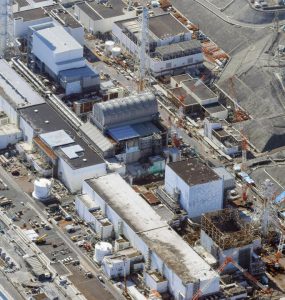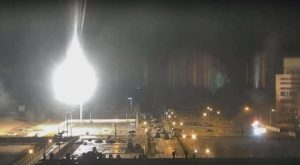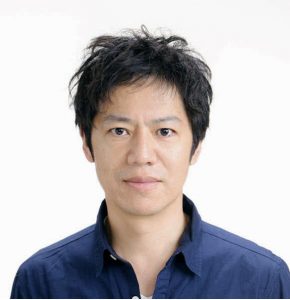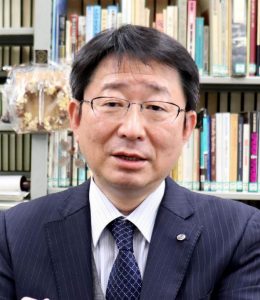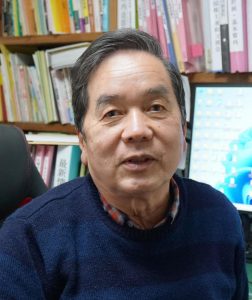Now is time to think about nuclear crisis in Ukraine, 11 years after Fukushima No. 1 (Daiichi) nuclear power plant accident
Mar. 15, 2022
by Yumi Kanazaki, Rina Yuasa, and Yumi Morita, Staff Writers
After its invasion of Ukraine, the Russian military has seized control of the Chernobyl nuclear power plant, as well as occupied the Zaporizhzhia plant, among the largest nuclear power plants in Europe. The military has also shelled Ukrainian research facilities managing nuclear materials. Russia’s President Vladimir Putin has even suggested that the country might use nuclear weapons. Because Russia’s folly endangers all humankind, the world is forced to confront the risks associated with the existence of nuclear power plants and nuclear weapons. Coincidentally, 11 years has passed since the Tokyo Electric Power Co. (TEPCO)’s Fukushima No. 1 (Daiichi) nuclear power plant accident, a disaster of unprecedented proportions. Herein, the Chugoku Shimbun interviewed three experts from different fields about how the world should consider and confront the current situation.
Tadahiro Katsuta, Professor, Meiji University
Crisis opened lid on huge risks
The danger associated with nuclear power being under the control of an enemy nation is undeniable, but I do not think Russia’s seizure alone has led to the crisis that is now experienced by the Chernobyl and Zaporizhzhia nuclear power plants. What happens in the future will depend on how Russian military’s invasion develops. As for the storage pools for spent nuclear fuel, the temperature of the fuel stored inside the plants is low. Even were the plants to be damaged, immediate risks on the order of destruction or a power blackout of a nuclear reactor under operation would probably not result.
The possibility, however, does exist for an unpredictable situation to arise. If the war goes against the Russian military and forces their withdrawal, Russia might act out of desperation before leaving. I am concerned about the physical and mental fatigue experienced by the plant operators who are being held by Russia.
From the perspective of safety regulations, the act of outsiders entering the power plants has caused a serious situation. The possibility remains that sensitive information or nuclear materials have been stolen. To this point, no country has seriously considered the risk posed to nuclear power plants in wars transcending national borders, although the potential for invasion by terrorists has been imagined. Given such a situation, safety must be enhanced for all nuclear plants throughout the world. Instead of regarding it as a far-off problem, Japan must now make the greatest possible effort to achieve security so long as it has nuclear plants.
However, the current situation should not be disregarded just because it seems frightening or by calling for a strengthening of nuclear power regulations. If Ukraine’s current situation is that frightening, there are other more important issues that must be faced.
Nuclear power plants involve huge risk on a daily basis. The plants are constantly bumping up against the threat of terrorism. Radioactive waste, which continues to be generated and accumulated following the production of power, is passed on to following generations. Were an accident to ever occur, local residents would be forced to endure all sorts of devastation and their lives would be taken for granted. Ultimately, such accidents would become the problem of everyone in that nation and even of people beyond its borders.
We have kept a lid on those potential risks and averted our gaze. Even when an accident would reveal a problem, the government, electric power companies, and citizens would once again cover up the issues after time had passed. That kind of cycle was repeated from before the accident at the Fukushima No. 1 (Daiichi) nuclear power plant.
In Japan, different words are used when communicating about nuclear technology. For military use, “nuclear” is used, and for peaceful purposes, “nuclear power.” In reality, regardless of use, the principle involved in using the energy from nuclear fission is the same. The energy cannot be distinguished scientifically or technically. Radiation negatively affects human health and causes environmental problems. I assume citizens in Hiroshima are fully aware of this reality through their own experiences. Although I yearned to do research into the field of nuclear fusion, my experience of living in Hiroshima when I was a student became the impetus for my career of inquiring into nuclear power.
Through the war in Ukraine, the once-closed lid is open again. It is time now to discuss the future of nuclear power. At the same time, however, we have to be on alert for the possibility that debate among politicians will take advantage of the crisis and lead to such risky ideas as “nuclear sharing.” Military buildup will escalate tensions among nations and also place nuclear power plants in jeopardy. We must therefore monitor the situation from Hiroshima and Nagasaki.
Profile
Tadahiro Katsuta
Born in Kagoshima City in 1968, he graduated from the Hiroshima Institute of Technology, earning a doctoral degree in engineering in graduate school at Hiroshima University. After working at the Citizens Nuclear Information Center and as a visiting researcher at Princeton University in the United States, he has served in his current position. He is a member of the Reactor Safety Examination Committee at the Nuclear Regulation Authority (NRA). His specialty is atomic energy policy.
Noriyuki Kawano, Director, The Center for Peace, Hiroshima University (CPHU)
A-bombed nation should take lead in charting course
From 2009 until recently, we have repeatedly conducted interviews with those who experienced the Chernobyl nuclear power plant accident in 1986 to understand how the event shaped their lives and psyches. I am now unable to get in touch with members of Zemlyaki, a group made up of victims affected by the accident who also participated in our interviews. I am very worried about them.
The Chernobyl accident resulted in the loss of homes and livelihoods for those affected. Such individuals also suffered from anxiety about their health and the possibility of being discriminated against because of their own status as victims. They had no option but to leave their homes at the time and, once more, are forced to evacuate again now. It is truly a tragic situation.
Through surveys conducted thus far, we found that 90 percent of the victims feel positively about nuclear power. That is because people understand well that their nation lacks energy resources. I assume the situation might be different now just as Russia has seized control and attacked the nuclear power plants. Their concerns surely are genuine because they experienced firsthand the catastrophic explosions that occurred at the nuclear plant.
I can say that Russia’s invasion of Ukraine this time has created three points of divergence among nations in the international community.
The first of those points is related to the thinking about nuclear weapons. In other words, should nations consider nuclear deterrence as an effective measure and strengthen their nuclear armaments, or reaffirm the danger inherent in nuclear weapons and pursue their abolition? Watching the situation in which Russia has threatened the non-nuclear Ukraine with the use of nuclear weapons, some nations would probably advocate the need to arm themselves with nuclear weapons. Alternatively, other nations might think it necessary to place further restrictions on such behavior with the Treaty on the Prohibition of Nuclear Weapons (TPNW) in order to eliminate such risk.
The second point of divergence relates to nuclear power, in other words whether countries choose to believe that such facilities are necessary to meet their energy demands, or whether they believe that possession of nuclear power is dangerous. When the Chernobyl nuclear accident happened, more than 110,000 residents had to flee from their homes. According to the Ukrainian government, 168 villages near the plant ceased to exist. If by any chance the functioning Zaporizhzhia nuclear power plant, one of the largest nuclear plants in Europe, were to explode, the damage would be of an even larger scale.
The third point is related to recognition of the principle of international cooperation. The commitment that no nation would seek resolution of conflict by military means, a principle adhered to by the global community since the end of the World War II, could begin to waver. Japan’s government has also provided conditional permission for the export of weapons to Ukraine. With such circumstances as an opportunity, discussions related to the pursuit of arming oneself with nuclear weapons and strengthening national defense capabilities are certainly possible.
Of these points of divergence, in which direction will Japan and the rest of the world chart course? I believe now is the time for the A-bombed nation of Japan to exercise leadership regarding the issue of promoting an international order that is not reliant on military force. Voices from Hiroshima and Nagasaki are what can serve as the driving force to move governments. We must continue to communicate the message that innocent civilians would be the ones to actually experience the “living hell” created by nuclear technology.
Profile
Noriyuki Kawano
Born in Shibushi City, Kagoshima Prefecture in 1966, he graduated with a doctoral degree from the Hiroshima University’s Graduate School of Biomedical & Health Sciences. After assuming several positions at the university such as research associate at the Research Institute for Radiation Biology and Medicine, he now serves as professor and director of The Center for Peace, Hiroshima University (CPHU). His specialty is research related to the atomic bombs/radiation exposure and peace studies.
Shoji Kihara, representative of No Nukes Hiroshima citizens group
Nuclear technology and humanity cannot coexist
Every time the Ukraine situation is covered in the media, my heart aches because it reminds me of the faces of local people I had previously met and interacted with.
Surprisingly, Russian President Vladimir Putin has insinuated the possibility of use of nuclear weapons, seized control of several nuclear power plants, and attacked nuclear facilities. I believe now the voices of A-bomb survivors, who know firsthand the inhumane nature of nuclear weapons, must be communicated to discourage Russia from choosing to use such weapons.
When I visited Ukraine the first time, 10 years had already passed since the accident at the former Soviet Union’s Chernobyl nuclear power plant. I accompanied members of a non-governmental organization’s exhibit of A-bomb photos in support of local people affected by the accident and shared my experiences with them as a second-generation A-bomb survivor.
Hiroshima and Chernobyl share common ground in the fact that both places experienced the nuclear devastation caused by human foolishness. During my journey to Ukraine, I kept asking myself about the significance of recounting my A-bombing story half a century before that time to people 10 years after the Chernobyl accident. As a result of my internal dialogue, I discovered the answer to that question: “Nuclear energy and humanity cannot coexist.”
At that time, the people in Chernobyl suffered from significant concerns about their health involving the aftereffects and genetic consequences of their exposure to radiation. At the same time, they had begun to fear that the accident was already being forgotten.
Then again, that is our issue. To what extent have the lessons from the accident at the nuclear power plant in Fukushima, which occurred 11 years ago, been impressed upon us?
I assume many people in Japan recognize how nuclear power plants can become impossible to handle. If that is the case, the nuclear plants in Japan also cannot be ignored.
I want to believe that nuclear reactors will not be attacked. If anything were to happen, however, people would suffer the consequences equally, regardless of their position as enemy or friend, as well as nationality. Once again, I simply do not believe that nuclear power should be used for the generation of electricity.
When guiding students coming to Hiroshima on their school excursions to the city, I often explain about the Peace Bell located in Hiroshima Peace Memorial Park. On the surface of the bell, there is a relief map of the world without any national boundaries. I convey to the students the idea that there are no borders with respect to nuclear damage. The phrase “Know thyself” is inscribed on the bell. I think the first step toward elimination of nuclear weapons and a world without war is to take stock of yourself.
Instead of simply observing the situation happening in Ukraine as a series of political tactics, we must develop the power to imagine the citizens running to and fro in an extremely frigid climate. We all must be able to use our own measures to enable us to consider each person’s life from his or her perspective.
The A-bombed cities have heavy burdens to carry, and their role to play in the world will grow ever more significant. The late Ichiro Moritaki, someone who supported the movement to ban A- and H-bombs as an A-bomb survivor, once said, “It is a question of whether nuclear technology will deny humanity or humanity will deny nuclear technology.” We are now on that precipice. Now is the time to once again think seriously about not only nuclear weapons but also nuclear power and take concrete action.
Profile
Shoji Kihara
Born in what was then the town of Itsukaichi-cho (now part of Hiroshima’s Saeki Ward) in 1949, he began to engage in anti-nuclear activities as a second-generation A-bomb survivor while engaged in his work career. He has served as representative of No Nukes Hiroshima, a citizens group, since 1978. He also serves as executive director of the Hiroshima Branch of Japan Congress against A-and H-Bombs (Gensuikin).
(Originally published on March 15, 2022)
After its invasion of Ukraine, the Russian military has seized control of the Chernobyl nuclear power plant, as well as occupied the Zaporizhzhia plant, among the largest nuclear power plants in Europe. The military has also shelled Ukrainian research facilities managing nuclear materials. Russia’s President Vladimir Putin has even suggested that the country might use nuclear weapons. Because Russia’s folly endangers all humankind, the world is forced to confront the risks associated with the existence of nuclear power plants and nuclear weapons. Coincidentally, 11 years has passed since the Tokyo Electric Power Co. (TEPCO)’s Fukushima No. 1 (Daiichi) nuclear power plant accident, a disaster of unprecedented proportions. Herein, the Chugoku Shimbun interviewed three experts from different fields about how the world should consider and confront the current situation.
Tadahiro Katsuta, Professor, Meiji University
Now is time to debate the future of nuclear power
Crisis opened lid on huge risks
The danger associated with nuclear power being under the control of an enemy nation is undeniable, but I do not think Russia’s seizure alone has led to the crisis that is now experienced by the Chernobyl and Zaporizhzhia nuclear power plants. What happens in the future will depend on how Russian military’s invasion develops. As for the storage pools for spent nuclear fuel, the temperature of the fuel stored inside the plants is low. Even were the plants to be damaged, immediate risks on the order of destruction or a power blackout of a nuclear reactor under operation would probably not result.
The possibility, however, does exist for an unpredictable situation to arise. If the war goes against the Russian military and forces their withdrawal, Russia might act out of desperation before leaving. I am concerned about the physical and mental fatigue experienced by the plant operators who are being held by Russia.
From the perspective of safety regulations, the act of outsiders entering the power plants has caused a serious situation. The possibility remains that sensitive information or nuclear materials have been stolen. To this point, no country has seriously considered the risk posed to nuclear power plants in wars transcending national borders, although the potential for invasion by terrorists has been imagined. Given such a situation, safety must be enhanced for all nuclear plants throughout the world. Instead of regarding it as a far-off problem, Japan must now make the greatest possible effort to achieve security so long as it has nuclear plants.
However, the current situation should not be disregarded just because it seems frightening or by calling for a strengthening of nuclear power regulations. If Ukraine’s current situation is that frightening, there are other more important issues that must be faced.
Nuclear power plants involve huge risk on a daily basis. The plants are constantly bumping up against the threat of terrorism. Radioactive waste, which continues to be generated and accumulated following the production of power, is passed on to following generations. Were an accident to ever occur, local residents would be forced to endure all sorts of devastation and their lives would be taken for granted. Ultimately, such accidents would become the problem of everyone in that nation and even of people beyond its borders.
We have kept a lid on those potential risks and averted our gaze. Even when an accident would reveal a problem, the government, electric power companies, and citizens would once again cover up the issues after time had passed. That kind of cycle was repeated from before the accident at the Fukushima No. 1 (Daiichi) nuclear power plant.
In Japan, different words are used when communicating about nuclear technology. For military use, “nuclear” is used, and for peaceful purposes, “nuclear power.” In reality, regardless of use, the principle involved in using the energy from nuclear fission is the same. The energy cannot be distinguished scientifically or technically. Radiation negatively affects human health and causes environmental problems. I assume citizens in Hiroshima are fully aware of this reality through their own experiences. Although I yearned to do research into the field of nuclear fusion, my experience of living in Hiroshima when I was a student became the impetus for my career of inquiring into nuclear power.
Through the war in Ukraine, the once-closed lid is open again. It is time now to discuss the future of nuclear power. At the same time, however, we have to be on alert for the possibility that debate among politicians will take advantage of the crisis and lead to such risky ideas as “nuclear sharing.” Military buildup will escalate tensions among nations and also place nuclear power plants in jeopardy. We must therefore monitor the situation from Hiroshima and Nagasaki.
Profile
Tadahiro Katsuta
Born in Kagoshima City in 1968, he graduated from the Hiroshima Institute of Technology, earning a doctoral degree in engineering in graduate school at Hiroshima University. After working at the Citizens Nuclear Information Center and as a visiting researcher at Princeton University in the United States, he has served in his current position. He is a member of the Reactor Safety Examination Committee at the Nuclear Regulation Authority (NRA). His specialty is atomic energy policy.
Noriyuki Kawano, Director, The Center for Peace, Hiroshima University (CPHU)
Three points of divergence in international society
A-bombed nation should take lead in charting course
From 2009 until recently, we have repeatedly conducted interviews with those who experienced the Chernobyl nuclear power plant accident in 1986 to understand how the event shaped their lives and psyches. I am now unable to get in touch with members of Zemlyaki, a group made up of victims affected by the accident who also participated in our interviews. I am very worried about them.
The Chernobyl accident resulted in the loss of homes and livelihoods for those affected. Such individuals also suffered from anxiety about their health and the possibility of being discriminated against because of their own status as victims. They had no option but to leave their homes at the time and, once more, are forced to evacuate again now. It is truly a tragic situation.
Through surveys conducted thus far, we found that 90 percent of the victims feel positively about nuclear power. That is because people understand well that their nation lacks energy resources. I assume the situation might be different now just as Russia has seized control and attacked the nuclear power plants. Their concerns surely are genuine because they experienced firsthand the catastrophic explosions that occurred at the nuclear plant.
I can say that Russia’s invasion of Ukraine this time has created three points of divergence among nations in the international community.
The first of those points is related to the thinking about nuclear weapons. In other words, should nations consider nuclear deterrence as an effective measure and strengthen their nuclear armaments, or reaffirm the danger inherent in nuclear weapons and pursue their abolition? Watching the situation in which Russia has threatened the non-nuclear Ukraine with the use of nuclear weapons, some nations would probably advocate the need to arm themselves with nuclear weapons. Alternatively, other nations might think it necessary to place further restrictions on such behavior with the Treaty on the Prohibition of Nuclear Weapons (TPNW) in order to eliminate such risk.
The second point of divergence relates to nuclear power, in other words whether countries choose to believe that such facilities are necessary to meet their energy demands, or whether they believe that possession of nuclear power is dangerous. When the Chernobyl nuclear accident happened, more than 110,000 residents had to flee from their homes. According to the Ukrainian government, 168 villages near the plant ceased to exist. If by any chance the functioning Zaporizhzhia nuclear power plant, one of the largest nuclear plants in Europe, were to explode, the damage would be of an even larger scale.
The third point is related to recognition of the principle of international cooperation. The commitment that no nation would seek resolution of conflict by military means, a principle adhered to by the global community since the end of the World War II, could begin to waver. Japan’s government has also provided conditional permission for the export of weapons to Ukraine. With such circumstances as an opportunity, discussions related to the pursuit of arming oneself with nuclear weapons and strengthening national defense capabilities are certainly possible.
Of these points of divergence, in which direction will Japan and the rest of the world chart course? I believe now is the time for the A-bombed nation of Japan to exercise leadership regarding the issue of promoting an international order that is not reliant on military force. Voices from Hiroshima and Nagasaki are what can serve as the driving force to move governments. We must continue to communicate the message that innocent civilians would be the ones to actually experience the “living hell” created by nuclear technology.
Profile
Noriyuki Kawano
Born in Shibushi City, Kagoshima Prefecture in 1966, he graduated with a doctoral degree from the Hiroshima University’s Graduate School of Biomedical & Health Sciences. After assuming several positions at the university such as research associate at the Research Institute for Radiation Biology and Medicine, he now serves as professor and director of The Center for Peace, Hiroshima University (CPHU). His specialty is research related to the atomic bombs/radiation exposure and peace studies.
Shoji Kihara, representative of No Nukes Hiroshima citizens group
Cultivate power to imagine actual situation of Ukrainian citizens
Nuclear technology and humanity cannot coexist
Every time the Ukraine situation is covered in the media, my heart aches because it reminds me of the faces of local people I had previously met and interacted with.
Surprisingly, Russian President Vladimir Putin has insinuated the possibility of use of nuclear weapons, seized control of several nuclear power plants, and attacked nuclear facilities. I believe now the voices of A-bomb survivors, who know firsthand the inhumane nature of nuclear weapons, must be communicated to discourage Russia from choosing to use such weapons.
When I visited Ukraine the first time, 10 years had already passed since the accident at the former Soviet Union’s Chernobyl nuclear power plant. I accompanied members of a non-governmental organization’s exhibit of A-bomb photos in support of local people affected by the accident and shared my experiences with them as a second-generation A-bomb survivor.
Hiroshima and Chernobyl share common ground in the fact that both places experienced the nuclear devastation caused by human foolishness. During my journey to Ukraine, I kept asking myself about the significance of recounting my A-bombing story half a century before that time to people 10 years after the Chernobyl accident. As a result of my internal dialogue, I discovered the answer to that question: “Nuclear energy and humanity cannot coexist.”
At that time, the people in Chernobyl suffered from significant concerns about their health involving the aftereffects and genetic consequences of their exposure to radiation. At the same time, they had begun to fear that the accident was already being forgotten.
Then again, that is our issue. To what extent have the lessons from the accident at the nuclear power plant in Fukushima, which occurred 11 years ago, been impressed upon us?
I assume many people in Japan recognize how nuclear power plants can become impossible to handle. If that is the case, the nuclear plants in Japan also cannot be ignored.
I want to believe that nuclear reactors will not be attacked. If anything were to happen, however, people would suffer the consequences equally, regardless of their position as enemy or friend, as well as nationality. Once again, I simply do not believe that nuclear power should be used for the generation of electricity.
When guiding students coming to Hiroshima on their school excursions to the city, I often explain about the Peace Bell located in Hiroshima Peace Memorial Park. On the surface of the bell, there is a relief map of the world without any national boundaries. I convey to the students the idea that there are no borders with respect to nuclear damage. The phrase “Know thyself” is inscribed on the bell. I think the first step toward elimination of nuclear weapons and a world without war is to take stock of yourself.
Instead of simply observing the situation happening in Ukraine as a series of political tactics, we must develop the power to imagine the citizens running to and fro in an extremely frigid climate. We all must be able to use our own measures to enable us to consider each person’s life from his or her perspective.
The A-bombed cities have heavy burdens to carry, and their role to play in the world will grow ever more significant. The late Ichiro Moritaki, someone who supported the movement to ban A- and H-bombs as an A-bomb survivor, once said, “It is a question of whether nuclear technology will deny humanity or humanity will deny nuclear technology.” We are now on that precipice. Now is the time to once again think seriously about not only nuclear weapons but also nuclear power and take concrete action.
Profile
Shoji Kihara
Born in what was then the town of Itsukaichi-cho (now part of Hiroshima’s Saeki Ward) in 1949, he began to engage in anti-nuclear activities as a second-generation A-bomb survivor while engaged in his work career. He has served as representative of No Nukes Hiroshima, a citizens group, since 1978. He also serves as executive director of the Hiroshima Branch of Japan Congress against A-and H-Bombs (Gensuikin).
(Originally published on March 15, 2022)

